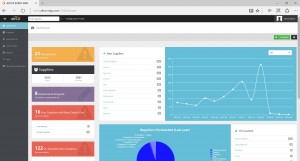By Gary Plant, Managing Director of supplier assessment and compliance specialist Altius
With stiffer sentencing guidelines for health and safety, corporate manslaughter and food safety and hygiene offences now in force for England and Wales, public sector organisations should tighten up health and safety compliance.
While organisations may have robust procedures internally, what about health and safety processes of those delivering your outsourced services. It’s necessary to ensure compliance across your entire supply chain.
New sentencing guidelines, which came into force on 1 February 2016, aim to create a consistent, fair and proportionate approach to sentencing organisations or individuals convicted of corporate manslaughter, health and safety and food safety and hygiene offences.
Hitherto, guidance for the courts in dealing with less serious health and safety and food safety offences has been lacking. The comprehensive new guidelines cover the most commonly sentenced health and safety offences and food safety offences in England and Wales.
According to the Sentencing Council, this could cover: “a building firm that causes the death of an employee by not providing the proper equipment for working at height, a restaurant that causes an outbreak of e. coli poisoning through unsafe food preparation, a manufacturer that causes injury to a new worker by not providing training for operating machinery or a gas fitter whose sub-standard work leads to the risk of an explosion in someone’s home.”
Large organisations (taking into account turnover or other measures of financial health) committing serious offences could feel the full force of the changes in higher penalties. The Sentencing Council has stated that some offenders will be subject to higher penalties, particularly large organisations responsible for more serious offences. But it says that fines will be “fair and proportionate to the seriousness of the offence and the means of offenders.” As such, the guidelines set out sentencing ranges that reflect the varied levels of risk of harm that can result from such offences.
The guidelines provide a starting point and a range of possible fines dependent on the seriousness of the offence and how culpable the offender is judged to be. This could range from minor failings in procedures to deliberately dangerous acts. For serious health and safety breaches, individual company directors could face prison sentences and heavy fines.
The new guidelines mean there is nowhere to hide when it comes to facing up to health and safety breaches and even if procedures and policies are robust in your own organisation, you could face exposure from suppliers. It is critical for organisations to scrutinise their health and safety policies, training and compliance, and ensure that risk is assessed across the entire supply chain and standards are applied and continuously monitored.
It’s more crucial than ever before that organisations have robust compliance procedures. This might mean swapping archaic spreadsheet-based compliance systems for more agile compliance software systems that provide total supply chain visibility and a complete health and safety compliance audit trail that is easily accessible and retrievable should a company end up defending itself.
Altius’ managed compliance services and software solutions help public sector organisations to manage compliance across their entire supply chain.
Request a free demo of Altius’ Exigo compliance software system that makes health and safety management easy
Further information www.altiusva.com








Recent Comments